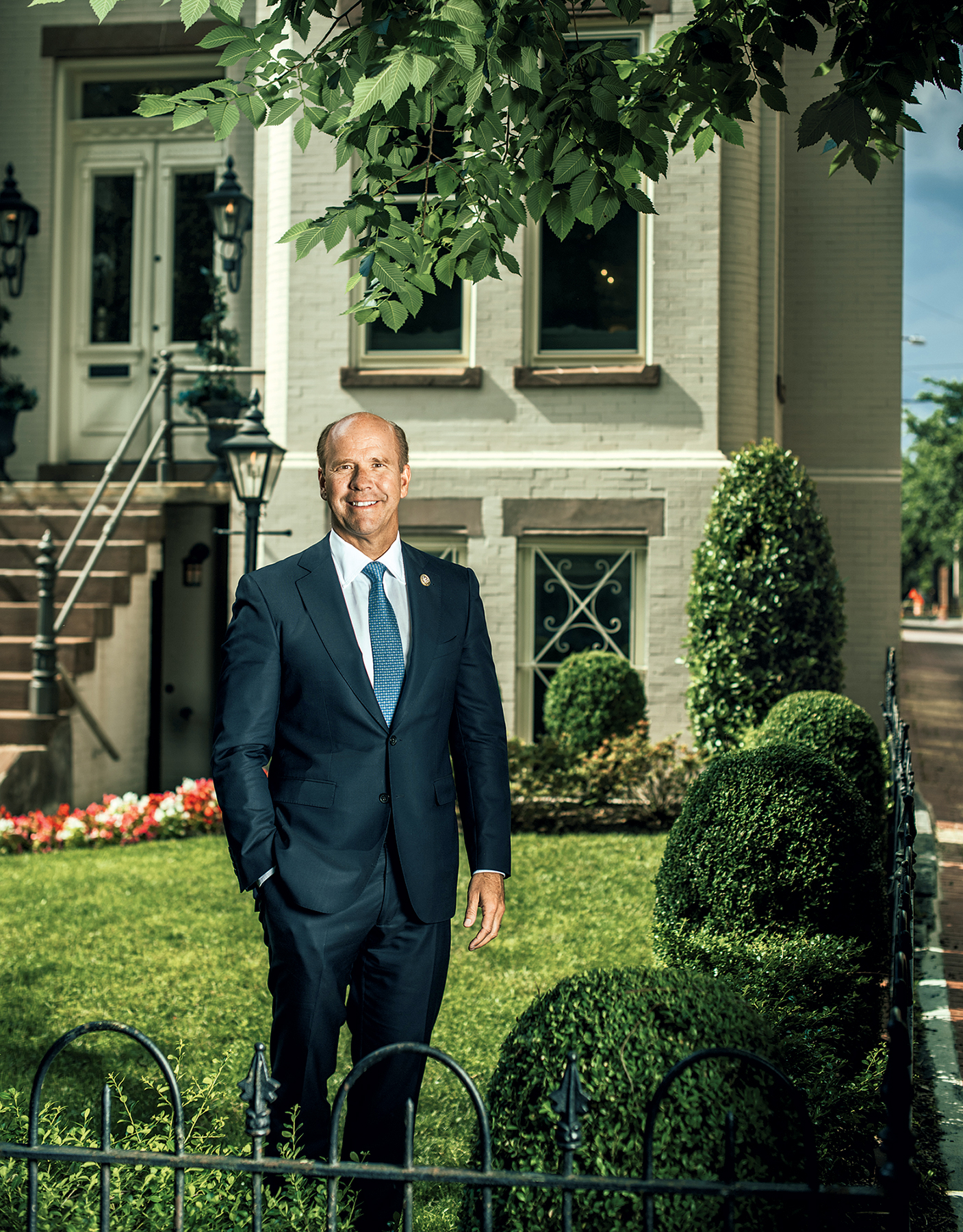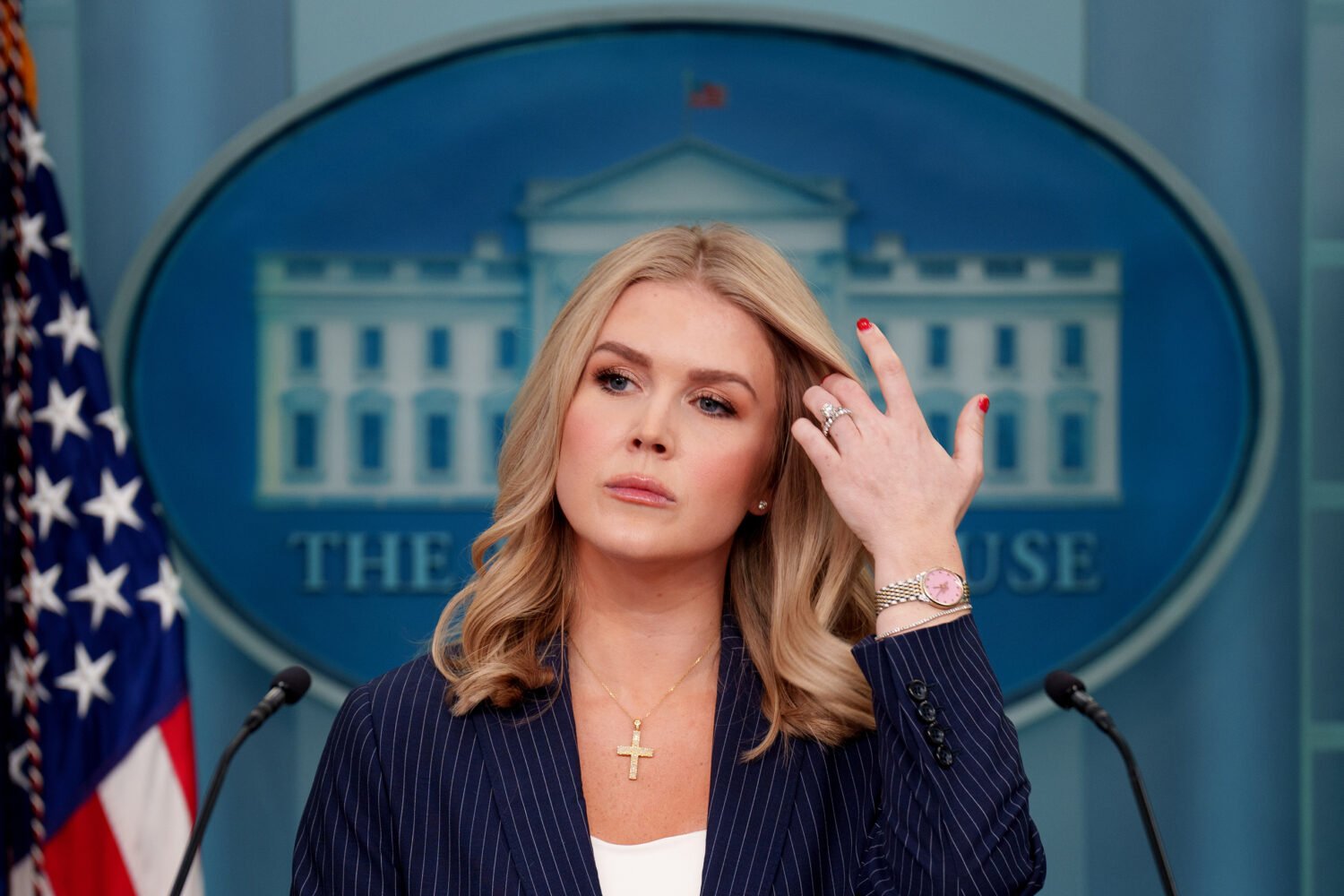It was the kind of thing John Delaney loves. On an early-spring morning, the Maryland congressman was in the Rayburn House Office Building at a meeting of the House Financial Services Committee. Beneath the high ceiling and cherrywood paneling, the panel was taking up a measure Delaney had written and that bore the hallmarks of the Democrat’s five-plus years in Congress—smart, bipartisan, important, and not at all sexy.
At issue: helping veterans who have to seek private treatment because Department of Veterans Affairs facilities have notoriously long waiting times. The VA has often been infuriatingly slow to reimburse those private physicians, leaving vets with damaged credit ratings. Delaney’s measure would make it much easier to prevent those in the first place. It passed unanimously in committee, with Tea Party backbenchers and fiery liberals offering praise for him.
Bipartisanship is the Potomac resident’s brand, his mantra, his calling card. Now he’s taking that to the world beyond his meandering, Montgomery County–to–West Virginia district—and doing so in a most improbable way: Delaney is the first announced Democratic presidential candidate for the 2020 election. He’s the darkest of dark horses. That’s not just because a sitting House member hasn’t won the presidency since 1880 or because the Washington area has never spawned a President. Those hurdles would be tricky in any year. But at this divisive moment in political history, can a moderate even make himself heard?
Delaney is trying. The 55-year-old entrepreneur and multimillionaire has a new book out that reflects his bring-us-together message, The Right Answer: How We Can Unify Our Divided Nation. (The title comes from a John F. Kennedy quote: “Let us not seek the Republican answer or the Democratic answer but the right answer.”) In the House, Delaney has touched the talismans of centrism and is arguably the member with the most let’s-fix-it ideas in the bipartisan Problem Solvers caucus.
“We should be the party that brings civility back to politics,” he says, not as a throwaway line but as an expression of the highest priority of Democrats, insisting it’s the only path to good policy and electoral victories. Now he has fully declared, traveling to Iowa while scoffing at the hedging-and-hawing most prospective presidential candidates go through. “I own my ambition,” he says.
That determination makes Delaney less of a long shot than he may appear. You wouldn’t bet your 401(k) on his chances of being the Democratic nominee, let alone President, but I confess that after spending some time with him, it seems worth $50 with long odds.
Bearing a faint resemblance to comedian Will Ferrell sans hair, Delaney is a coil of determination. Touch his arm and he’s surprisingly ripped. Atlantic Media owner David Bradley, who has founded and acquired several Washington-area companies, is a close friend, having taken family vacations with Delaney for years. “I saw a man who couldn’t play tennis at all who swallowed that game carnivorously,” Bradley says. “He does that with everything.”
You might think friends—real friends—would try to talk Delaney out of it, tell him he’s nuts. But that’s not what happened in the elite circles in which Delaney moves. They saw in the former CEO someone who’s realistic about his slim chances (“I don’t think he would give himself more than a 10-percent chance,” says Bradley) but who also understands that presidential primaries are unpredictable. Marquee names often get toppled—Barack Obama beating Hillary Clinton, Donald Trump vanquishing the field. Or, as Delaney cites, one-term Georgia governor Jimmy Carter knocking over a star-studded 1976 Democratic roster.
“What I’ve told John is that in an open nomination, 15 to 20 people run and all but one of them lose—even the person at the front of the field is an underdog,” says Ron Klain, the Democratic lawyer who was chief of staff to Vice Presidents Al Gore and Joe Biden and has worked multiple presidential campaigns. “John’s analytical. If he was starting a business, he’d make 200 calls and think it through,” says Jeff Zients, the Washington investor and former acting director of the Office of Management and Budget. “It’s the same with this.”
Delaney’s already working DC dinners with journalists and town meetings in Iowa and New Hampshire. He may go on the road with his wife, April, and their four daughters next year, exchanging their home in Potomac’s Bradley Farms neighborhood for an RV. (Delaney has an estimated worth of well over $200 million, which can help him with self-funding.)
You wouldn’t bet your 401K on him, but after spending time with Delaney, it seems worth $50 with long odds.
Little in his background would have presaged his preternatural confidence. His late father was a union electrician in New Jersey who took his boy to job sites and never went to college; nor did Delaney’s mother. It’s a modern log-cabin story: The International Brotherhood of Electrical Workers picked up half of Delaney’s tuition to Columbia. A premed, Delaney opted for law school at Georgetown but then quickly abandoned life at a big law firm to become a freakishly successful businessman with a publicly traded company just 11 years out of college. He had two successful publicly traded companies by the time he was 40.
If you could personify Washington’s business boom of the 1990s, Delaney would be its embodiment: proof that, like a Steve Case, you could make your bones here without ever being in government service or its attendant industries such as lobbying. Delaney’s companies, Health Care Financial Providers and CapitalSource, found overlooked markets and made him rich, part of the Washington area’s elite. He and his wife, whom he met at Georgetown Law, are extremely active in Catholic Charities. (A parochial-school grad, Delaney gave Cardinal Theodore McCarrick his first BlackBerry and attends Bethesda’s Church of the Little Flower, the same parish as Chief Justice John Roberts. Ecumenical, Delaney also chaired the board at St. Patrick’s Episcopal Day School in Northwest DC.) The Delaneys’ annual Christmas party is a giant tented affair but one where the congressman has been known to help push cars that get stuck.
If Delaney managed to become the Democratic nominee, he’d be a good foil to Trump. The current President is a New York City creature, a mash-up of outer-borough rage and Manhattan tabloids, who finds his strongest support in depressed small towns. Delaney is proudly suburban. (While that’s where the battleground is for the presidency, America has never had a leader from the burbs.) The contrasts continue: self-made wealth versus head start in inherited riches, wonky centrism versus ideological dyspepsia, big heart versus ingrained venality.
“Trump has never created anything of lasting value,” Delaney says. (The two have never met.) “Business leaders create jobs and pay their bills. His basic mindset is ‘Tails, I win; heads, you lose.’ ” Checking all the Democratic boxes (pro-choice, pro–immigration reform), Delaney has room to be centrist on taxes and business. When I met with him, he was upset about some Democrats’ reflexive unwillingness to modify the Dodd-Frank financial law—regulations imposed on Wall Street after the 2008 financial crisis—which he supports and voted to update. “Everything needs tinkering,” he said. “You can’t support jobs and be anti-business.” He’s a font of ideas on everything from apprenticeships to unlinking health care and retirement from your job.
But can Delaney thrive in an age of Democratic fury? Senator Elizabeth Warren has attacked efforts to modify Dodd-Frank. With the reasonableness of an Aspen Institute panel, is he equipped to be the superego to his party’s progressive id, to the emotions of #Resistance, #MeToo, and #BlackLivesMatter? (It helps that he has lots of liberal friends in the House, including an unlikely affinity with Jamie Raskin, who’s as much a Takoma Park progressive as Delaney is a Potomac centrist.)
His best chance at the Democratic nomination is if the race comes down to two candidates—one centrist, one progressive/liberal. “If he can win his lane, he can win,” says Bill Knapp, who was Delaney’s media consultant for his congressional bids and knows something about centrist races as a veteran of Michael Bloomberg’s campaigns.
That makes sense. Delaney has witnessed the madness of the era up close. In 2014, he ran for his second congressional term against a former Secret Service agent and now Fox News contributor and host of NRATV, Dan Bongino, who is as comfortable in the fever swamps of anti–Robert Mueller passions as Delaney is with an Excel spreadsheet and a TED Talk. He came within 2,700 votes of losing to a pre-Trump Trumpian.
Having nearly been burned by the free-floating anger of our time, he’s gambling on better angels, convinced that a guy who becomes super-animated talking about repatriation of corporate income tax will be able to galvanize Bernie bros and the country. I ask him about the rage out there and if he sees something others don’t.
“I think so,” he says. “I don’t think it’s an election about who can out-Trump Trump.” Then he adds: “If it is, I’m not the right candidate.”
This article appeared in the July 2018 issue of Washingtonian.


















